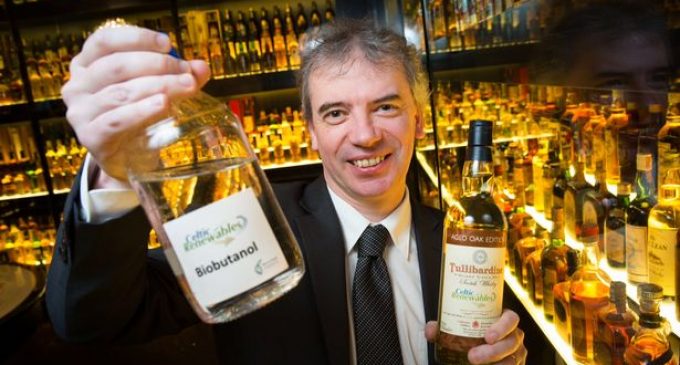Producing Biofuel From Whisky Industry Waste

A spin-out company from Edinburgh Napier Univesity has become the first in the world to produce biofuel capable of powering cars from residues of the whisky industry. Celtic Renewables now plans to build a production facility in central Scotland after manufacturing the first samples of bio-butanol from the by-products of whisky fermentation.
A spin-out from the university’s Biofuel Research Centre (BfRC), the company has spent the last year developing its process at industrial scale in Belgium as part of a £1 million programme funded by the Department for Energy and Climate Change (DECC) under its Energy Entrepreneurs Fund.
It is now seeking funding from the Department for Transport’s (DfT’s) £25 million advanced biofuel demonstration competition and, if successful, hopes to build its first demonstration facility at the Grangemouth petrochemical plant by 2018.
Company owners estimate it could be the market leader in an industry worth more than £100 million to the UK economy.
Celtic Renewables, in partnership with the Ghent-based BioBase Europe Pilot Plant (BBEPP), produced the first samples of bio-butanol from waste using a process called the Acetone-Butanol-Ethanol (ABE) fermentation earlier this month.
Professor Martin Tangney (pictured), director of the Biofuel Research Centre and the company’s founder and president, guided the research to develop the fermentation technology being commercialised by Celtic Renewables.
ABE fermentation was first developed in the UK a century ago, but died out in competition with the petrochemical industry. However bio-butanol is now recognised as an advanced biofuel – a direct replacement for petrol – and the Scottish company is seeking to reintroduce the process to Europe for the first time since the 1960s, using the millions of tonnes of annual whisky production residues as their unique raw material.
The biofuel is produced from draff – the sugar rich kernels of barley which are soaked in water to facilitate the fermentation process necessary for whisky production – and pot ale, the copper-containing yeasty liquid that is left over following distillation.
Professor Tangney says: “Showing the world our first sample of biofuel produced from whisky by-products is a proud moment for everyone involved. We have successfully taken a defunct technology and adapted it to current market conditions, attracting the investment and partners required to scale-up to industrial production and prove that this works at scale. This historic sample could herald a new era in sustainable biofuel and the birth of a UK industry worth £100 million-a-year.”
Professor Wim Soetaert, chief executive of the Bio Base Europe Pilot Plant, says: “This project is a true partnership and we are proud of the role we have played in making biobutanol from Scottish whisky residues. We are excited about the future with Celtic Renewables.”
Winners of the DfT competition will receive funding of up to £12 million over three years to build a biofuel facility that should be operational by December 2018 and producing at least 1million litres of biofuel-a-year.
Mark Simmers, chief executive of Celtic Renewables, comments: “The process we have perfected takes residues that present a disposal issue to the whisky industry and creates value by producing not only sustainable biofuel but also green chemicals and high grade animal feed. The exciting challenge for us now as a business is to convert our proven technology into a multimillion pound industry, and building our first demonstration plant is the next critical step to achieving that goal.”
The by-products were provided by Tullibardine, the Perthshire distillery that has worked in partnership with Celtic Renewables since 2012.
Ed Davey, Secretary of State for Energy and Climate Change, says: “This novel technology takes the by-products of Scotland’s finest export to power vehicles, and it is this kind of world-leading innovation that the Energy Entrepreneur Fund was designed for.”

































